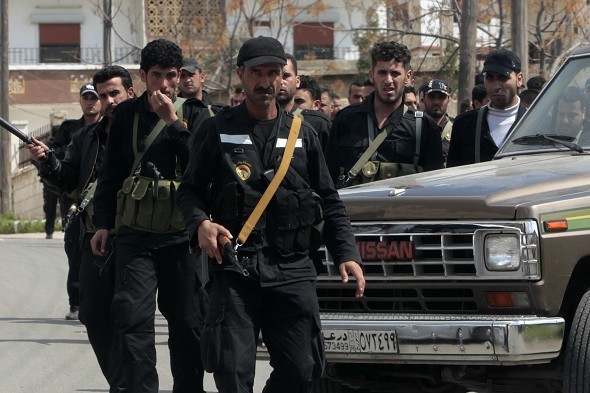IN THE MEDIA
Human rights? Surely you can’t be Syria
April 14, 2011 | Arsen Ostrovsky

Arsen Ostrovsky
The Punch – 14 Apr 2011
Syria is one of four candidates vying for four seats on the 47-member body that will go to Asian nations when the General Assembly votes on new members on 20 May.
Unless another Asian country nominates, which seems unlikely at this stage, Syria will win a three-year term on the UN body charged with strengthening the promotion and protection of human rights around the world.
In a recent letter to the President of the UN General Assembly, Syria’s mission to the UN said “promotion and protection of human rights are of the highest importance to Syria”. The actions of the Syrian regime, however, speak otherwise.
According to Amnesty International, at least 210 people have now been killed as unrest in Syria enters its fourth week.
Over the weekend alone, at least 37 people were killed during pro-democracy protests throughout the country, as Syrian security forces continue to fire on protesters, while simultaneously carrying out arbitrary arrests, torture and beatings.
In Deraa and Damascus, tens of thousands marched in funerals for some of the dead, chanting “freedom, freedom”.
In the meantime, Syria has prevented international journalists and news media outlets from reporting from Deraa and have cut mobile phone lines, so as to prevent “leaking” of human rights atrocities.
But Bashar Ja’afari, Syria’s Ambassador to the UN thinks “these are two different issues”. And if the UNHRC’s record is anything to judge by, he is right.
As long as the UNHRC continues to count gross human rights violators such as Saudi Arabia, Bahrain, China, Russia, Pakistan and until recently, Libya, among its members, then clearly observing even a modicum of human rights has no correlation to being elected to this body.
The UNHRC was formed in 2006 specifically in order to create a new body to tackle human rights abuses in light of the failures of its discredited predecessor, the UN Human Rights Commission.
The Commission was largely criticised for its one-sided obsession with Israel and the make-up of its members, which included, amongst others, Sudan, Zimbabwe and Cuba.
Libya even chaired the Commission during 2003. Former Secretary General Kofi Annan said this contributed to the Commission’s “fatal credibility deficit” – one that was casting “a shadow on the reputation of the United Nations system as a whole.”
Sadly, however, the new UNHRC has done little to improve the reputation of the United Nations and continues to make a complete mockery of human rights as a concept.
The current crop of UNHRC members includes at least three states (Saudi Arabia, China and Cuba) that were among Freedom House’s ‘Worst of the Worst’ regimes in its annual 2010 Freedom in the World survey.
In addition, other members currently on the UNHRC, including Russia, Bahrain, Jordan, Qatar and Angola were ranked as ‘Not Free’. Many more could not even scrape above “Partly Free”.
Syria, the latest bastion of human rights to seek a place on the UNHRC, is also ranked by Freedom House as “Not Free” and had one of the lowest possible ratings for both political and civil liberties –even before last week’s killings.
On the subject of Israel, according to Hillel Neuer, Executive Director of Geneva based NGO, UN Watch, the UNHRC has “gone from bad to worse…with terrible lies and moral inversion, it is being turned into a nightmare”.
Like its predecessor, the UNHRC has continued to pass resolution after resolution singling out and censuring the sole democracy in the Middle East, Israel.
Even Justice Goldstone, in his op-ed of 1 April in the Washington Post exonerating Israel from the key findings of the notorious Goldstone Report, conceded that the UNHRC has a “history of bias against Israel [that] cannot be doubted”.
Since its creation in 2006, the UNHRC has condemned Israel in 49 per cent of its country specific resolutions, four times more than the next ranked country – Myanmar. It is the only country that is subject to an entire agenda item every session.
Moreover, it has failed to issue even a single condemnation against Saudi Arabia, China, Cuba or Russia.
Even UN Secretary General Ban Ki-Moon has criticised his own council for “picking on Israel” given the “range and scope of allegations of human rights violations throughout the world”.
Then, only two weeks ago, as Syria ramped up its slaughter of pro-democracy protestors while putting the finishing touches to its UNHRC application, the only country to be singled out by the UNHRC for special opprobrium was none other than its favourite punching bag – Israel, with six resolutions condemning the Jewish state, primarily for settlement activity.
The UNHRC could not even muster a semblance of condemnation against the heinous massacre of an Israeli family in their sleep in Itamar by Palestinian terrorists, the deadly Jerusalem bus bombing, or ongoing rocket attacks from Gaza on Israeli civilian towns.
That Syria was able to nominate for the UNHRC in the first place, let alone has a strong chance of winning a seat, is reflective of the endemic problem with the body – the fact that observance of human rights is no barrier to becoming a member.
This must change immediately, or the entire UN brand risks further damage beyond repair.
As it stands, however, the UN body charged with promoting and protecting human rights, the UNHRC is doing the exact opposite. It is granting impunity to the world’s worst human rights abusers while ignoring the pleas of victims around the world.
Tags: International Security





